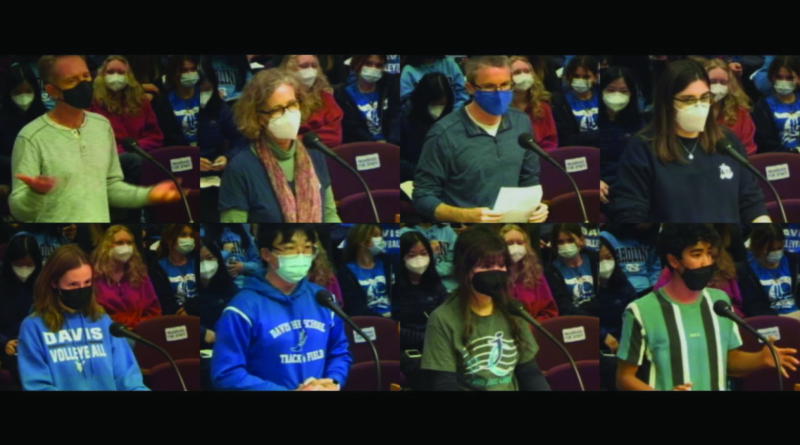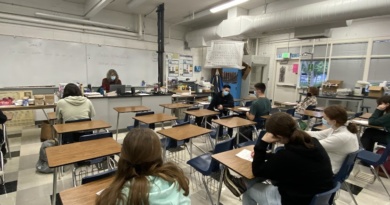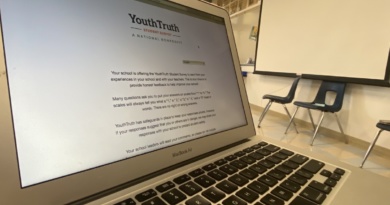“Unheard and ignored”: School board chooses three-block schedule despite flood of disapproval from teachers and students
PHOTO: Students and teachers speak at the school board meeting on Jan. 20.
By Lewis Herring-Tillman & Shira Kalish,
BlueDevilHUB.com Staff–
Parents, teachers and students gathered at the Davis Joint Unified School District board meeting on Jan. 20 to protest the district’s new high school schedule, which, although broadly unpopular, was voted into effect for the 2022-23 school year.
Over the course of several months, a committee of educators and other District staff members had been redesigning the school schedule to fit a California law requiring that all high schools start the school day no earlier than 8:30 a.m. Schedule one continued the two-day block, while schedule two was a three-day block, with staggered classes on Tuesday, Wednesday, and Thursday. Schedule two reduced block periods to 70 minutes, compared with Schedule ones 90-minute block periods.
The school board approved schedule two on Dec. 16—disregarding the committee’s recommendation and the results of the survey the district had sent out to teachers and students, in which a majority voted for schedule one.
Despite 20 scathing public comments at the Jan. 20 board meeting, the school board made no motion to reconsider the schedule choice. Among the comments were several coordinated speeches from teacher groups and from the student-run organization Davis High Students for a Two-Block Schedule.
“When (student) feedback and opinions are disregarded, especially on a schedule that directly impacts their lives, it makes them feel unheard and ignored,” junior Maddie Hayes said.
Senior Drew Liu quoted an anonymous teacher who said that they will retire early due to the schedule decision.
“I’m having to prioritize my socio-emotional health over… staying at a job that I have loved, been good at, felt strongly connected to, and considered my life’s calling,” the teacher said. “Sadly — or wisely — I’m no longer willing to sacrifice my time and talent for a dysfunctional district.”
Science teacher Jean-Paul Whittall read the studies that the school board used to back up their schedule decision, and found that most of them were at least 13 years old, or took place in the 1990s. He believes many were inconclusive, and some were irrelevant to the three-block schedule as a whole.
After the decision to switch to a three-block schedule was announced, Davis High Students for a Two-Block Schedule started a petition to reinstate the two-block schedule, which garnered over 1,100 signatures from students and staff. The group also sent out surveys. Of those who responded, 93% of students, 91% of parents, and 79% of teachers said that they preferred the two-block schedule.
“The results are clear. You, the school board, have decided against the wishes of over 90% of the student body you are supposed to represent,” junior Elliot DeJong, who started the petition, said. (DeJong is a section editor for the HUB, and was not a part of the reporting team for this article.)
On Jan. 18, an email was sent out to students explaining the reasoning behind the school board’s decision. One of the reasons was that “student stress is decreased as a result of fewer seven period days each week.”
However, junior Hanni Yu said at the Jan. 20 meeting that students “filled out the surveys with (this interest) in mind.”
“We ourselves are the ones most aware of the effects this schedule will have on our own focus and mental health,” Yu said.
When explaining why the board chose the three-block schedule, Trustee Vigdis Asmundson said that non-block periods have a very compressed amount of time available for learning, particularly in classes that require equipment. She told the audience on Jan. 20 that the two-block schedule allows for just one day of “experiential, deep-dive learning” and encourages “compressed direct instruction and lecture” on the remaining days.
Students reported on the survey and at the meeting that they prefer the two-block schedule because it is hard for them to focus during block periods.
Students did recognize that block periods are necessary for science labs and long tests, but still want the number of block days limited to twice per week. Students said at the meeting that the two-block schedule’s longer, less frequent block periods allow science classes to do labs which might be rushed during the 70-minute block periods of the three-block schedule.
Sophomore Rachel Levy brought up that schedule two has four different school day ending times in a week for students with less than seven classes, which is inconvenient for students who have a job as well as for parents who will have to adjust their busy schedules to four separate pick-up times.
Junior Ben Simon told the board that the three-block schedule would be particularly difficult for students like him because his ADHD makes it even harder for him to focus through long periods of time.
Trustee Asmundson said that she believes the complaints about block periods are a result of a miscommunication about their purpose.
“One of the benefits of the conversations that have occurred is to bring to light some of the discontent with the utilization of the blocks and need for improved pedagogy in their use,” Asmundson said.
“It’s essential that we have additional professional development and ongoing support prior to and during implementation that occurs to ensure that instructional minutes are used for the highest amount of engagement and effectiveness.”
DaVinci High math teacher Elizabeth Broughton said on Jan. 20 that such a drastic change to the schedule is stressful and labor intensive for teachers.
“Adopting schedule two requires a fifth pivot in instructional practice since March 2020,” Broughton said. According to Broughton, such a drastic change forces teachers to create a “full-scale revision of all of our lessons and labs, semester plans, and course maps.”
“Is the District prepared to compensate us for working through the summer of 2022? Asking teachers to give up significant personal time to rewrite their curriculum … demonstrates a serious misunderstanding of our current workload and teacher morale,” Broughton said.
“I’ve often lamented … that teachers and the district office are on different teams … and I said this so many times that somebody brought it to my attention and said, ‘No, no, Tim, we’re not on different teams. We’re playing entirely different sports,’” science teacher Tim Peevyhouse said in his comments before the board.




